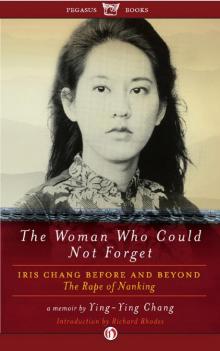- Home
- Richard Rhodes
Woman Who Could Not Forget Page 2
Woman Who Could Not Forget Read online
Page 2
“What are we going to do?” Shau-Jin asked me in desperation.
“I don’t know,” I said, my voice shaking. “Let me check with the police.”
I called the San Jose Police Department with the case number Brett had given us and asked whether the police had any news about Iris. One officer told me that the police had already put her name and her car’s license plate number into the missing-persons database.
“No new information,” he told me, assuring me that police would inform us of any developments right away.
I was so desperate, I called the Police Department every half hour or so. I always got the same answer.
“What do you think Iris will do?” I asked Shau-Jin.
He didn’t answer. He was as scared as I was.
I decided to share the news with all our close relatives. First I called my son, Michael. He was the only other person who really knew what was going on with his sister. Michael was a software engineer for a Silicon Valley company, and his office was close to our home. Unfortunately, Michael was in New York on business. I reached him on his cell phone and he listened in stunned silence, quickly deciding to fly back home as soon as possible.
I also called my older brother, Cheng-Cheng, in nearby Palo Alto, my younger brother, Bing, in New Jersey and my younger sister, Ging-Ging, in Maryland. In the meantime, Shau-Jin called his two brothers, Shau-Yen in New Jersey and Frank in Los Angeles, in hopes that they could offer guidance. They were all in shock, because Iris had prohibited us from telling anyone, even close relatives, about her nervous breakdown. None of my siblings even knew Iris had been depressed. They tried to calm me down, saying that Iris would certainly change her mind about taking her life and return home soon. But they offered no concrete ideas of what I should do.
Each of them soon called me back and asked me details about Iris’s recent struggle with depression. Repeating the details over and over left me exhausted.
It was ironic that one of the worst days in my life up until that point, September 21, 2004, had given me hope. That was the day that Iris went missing for several hours. At the time, Brett was out of town and we were taking care of her.
When she didn’t return home by late afternoon as promised, we reported her missing to the police. At the time, she was taking a new antipsychotic drug called Abilify, plus the antidepressant Celexa. She had experienced side effects from the drugs: shoulder and leg pain, drowsiness, and agitation.
Against my wishes, she had insisted on driving herself to the library that morning. When she returned home at about 8 P.M., she told us that she had checked into a Crowne Plaza Hotel close to where we live. She said she had become so sleepy after shopping that she had gone to the hotel and fallen asleep for several hours. We were extremely relieved, of course.
So I thought that maybe she had checked into a hotel again. I opened the Yellow Pages with shaking hands and called the Crowne Plaza and other major hotels in the area, asking whether they had a guest named Iris Chang or Iris Douglas, her married name. They didn’t.
I then looked up the phone numbers of spas in the seaside city of Santa Cruz and in the forested mountains west of San Jose. Iris liked getting massages and had often gone with Brett and her friends to spas there. But spa employees told me they didn’t have any guests named Iris, or anyone who matched her description. Still, I had some hope that she’d registered under a different name.
My brain was fried, my body trembling. I kept calling Brett to ask if he had any new information. He didn’t. Brett had informed his parents in Illinois about her disappearance and was busy searching Iris’s home office for clues and sending all the information he could to the missing-persons detective assigned to Iris’s case.
As Shau-Jin kept pacing back and forth in the family room, I suddenly envisioned Iris browsing in a bookstore, one of her favorite things to do since she was a child. I systematically called several big bookstores in the area. I asked them whether they had seen a thin, tall Asian woman with long black hair in the store. Again, no luck.
I called Iris’s cell phone but, as usual, it was turned off. I also wrote her an e-mail, pleading with her to come home. I assumed she would be checking her e-mail periodically, even if she was hiding somewhere.
By late afternoon, my throat was dry and coarse from talking on the phone. I was drained and devastated, and the police continued to tell us that there was nothing new. I told Shau-Jin that we needed to go look for her car, even though I figured the chances of finding her were slim. Still, I told Shau-Jin, we needed to search for her. I couldn’t just sit at home and do nothing.
Shau-Jin drove up and down the rows of cars in the parking lots of several nearby hotels and places she liked to shop, as I scanned all the cars and license plate numbers. I was in a different world, oblivious to all the people around me. I concentrated only on scanning the parked cars and their license plates. But Iris’s car was not there.
My heart was still pulsating with anxiety, and my hope faded as twilight turned into darkness. Under the dim yellow lights in the parking lot of the Crowne Plaza Hotel, we circled the lot one more time. Finally, we gave up and drove home.
I felt as if I were on the edge of a cliff, about to fall down into a deep valley below. I became even more frightened as I peered out the windows of our townhouse into the night sky. If she had driven to a strange place, she could had been robbed or even killed by someone in the street because she was so mentally vulnerable. It had been eighteen hours since she’d printed out the note, and no one could tell us where she was.
At about 8 P.M., I called Iris’s most recent psychiatrist and told him that Iris had disappeared and left a suicide note. He asked me to read the note to him.
Previously, the psychiatrist had always thought I was a neurotic mother and too protective of Iris. He hadn’t believed Iris was suicidal until we informed him that Iris was browsing suicide Web sites. But Iris never disclosed her innermost feelings to him.
I once asked Iris what she talked about during her therapy sessions. She said she and the psychiatrist spent a lot of time talking about the philosophy of life. It seemed too abstract to me. I worried that she wasn’t getting the help she needed.
Now the psychiatrist was telling us that Brett, Shau-Jin, and I should go to the Golden Gate Bridge, one of the most popular places in the world to commit suicide, because Iris had mentioned “drowning in an open sea” in her suicide note. Hearing his words, I felt my spine dripping with cold sweat. He urged us to drive to the bridge and check out the parking lots. But Shau-Jin and I were already exhausted physically and emotionally after a day of fruitless searching. We did not have the energy to drive to San Francisco.
But I was able to find the phone number of the Golden Gate Bridge Patrol. I gave an officer Iris’s car license plate number and description of what she looked like. For the next few hours, I was in constant contact with the officer. He was patient and kind.
Eventually, however, he told us that no one who looked like Iris was near the bridge, and her car wasn’t there either.
A creepy thought engulfed me: if Iris had driven her car over a cliff and plunged into the ocean, we might never find her.
I also thought about how she had talked in recent weeks about “escaping.” What if she had driven to some remote place and planned to hide there indefinitely? “O, Iris, please come home,” I shouted to myself in desperation.
I can’t recall when I fell asleep that night. I just remember the frightening sound of a ringing telephone piercing the quiet darkness. It was Brett. He said he was coming to our home with a police officer. I looked at the clock on the wall. It was nearly midnight.
We opened the door. Brett and a plainclothes officer came in. Both looked solemn.
“I’m sorry to inform you that Iris is dead,” the officer said. “She shot herself early this morning and her body was found in her car, near Los Gatos.”
I felt as if I’d been caught in a violent storm. The thunder was deafening.
The lightning blinded me. The earth seemed to shake.
Shau-Jin and I collapsed onto the carpet of our living room, and I found myself falling into an endless black tunnel. I heard my voice echoing:
“Iris, Iris, how could you kill yourself? How could you desert Christopher, me, and your father?
“How could you do such a thing to me?
“How can I live the rest of my life without you?”
But I would have to. All I have now are decades of memories—some haunting, but most filled with love.
Iris Chang was the author of a 1998 New York Times best seller, and when she died she was only thirty-six years old.
Her bestselling book, The Rape of Nanking: The Forgotten Holocaust of World War II, published in 1997, on the sixtieth anniversary of the massacre, examines one of the most tragic chapters of World War II: the slaughter, gang rape, and torture of hundreds of thousands of Chinese civilians by Japanese soldiers in the former capital of China. The book made a huge impact on the global redress movement regarding the Imperial Japanese war crimes in Asia during World War II.
Her death shocked the world. No one believed a best-selling author, a young, beautiful rising star like Iris Chang, would kill herself. Her death was headline news in almost all the major newspapers throughout the world. The news was also immediately broadcast over radio and TV stations. The shockwave hit Chinese Diaspora communities hard, all over the globe.
On November 19, 2004, six hundred people showed up on short notice to her funeral in Los Altos, California. The chapel at Gate of Haven cemetery was too small for such a huge number of people; mourners overflowed onto the lawn outside the chapel. Many of them were Iris’s friends and supporters, but most were strangers and admirers. Letters, telegrams, and flowers of condolence poured in from all corners of the world.
During the funeral, James Bradley, the best-selling author of Flags of Our Father and Flyboys, addressed his eulogy to Iris’s two years old son. He said, in part (the complete text of the Eulogy is located in the Appendix),
Christopher, your mother was Iris Chang. . . . Five years before you were born, I was struggling in my effort to write a book about the six flag-raisers in the photo.
For two years I had tried to find a publisher. Twenty-seven publishers wrote me rejection letters. . . .
Flags of Our Father became a New York Times #1 best seller. Twenty-seven publishers had said ‘No.’ Your mother had said ‘Do it. . . .’
(She) touched millions and will be remembered on all continents in countless ways. Here is just one of them. . . .
And later—when you make that difficult but rewarding inner journey to discover your unique mission in the universe—when you find your personal truth—I hope you will acknowledge the example of your valiant mother who once fearlessly told truth to the world.
Perhaps you will write an acknowledgement to her, a thank-you like I once did.
A thank-you that begins with two bright and hopeful words.
Those two beautiful words: Iris Chang.
Michael Honda, of the California House of Representatives, made a tribute to Iris in the form of the Congressional Record in the 108th Congress. He stated that “Iris will be remembered for her work and service to the community. . . . Our community has lost a role model and close friend; the world has lost one of its finest and most passionate advocates of social and historical justice.”
In Iris’s obituary in the New York Times, Iris’s agent, Susan Rabiner, said “The Rape of Nanking spent ten weeks on the New York Times ‘Best Seller’ list, and close to half a million copies have been sold,” and “The book drew wide international attention.”
In the Los Angeles Times, the obituary read, “The late historian Stephen Ambrose said Chang was ‘maybe the best young historian we’ve got, because she understands that to communicate history, you’ve got to tell the story in an interesting way.’”
George Will, the Washington Post columnist, praised Iris in his 1998 article, saying “Something beautiful, an act of justice, is occurring in America today. . . . Because of Chang’s book, the second rape of Nanking is ending.” And reporter Richard Rongstad eulogized her with these words: “Iris Chang lit a flame and passed it to others and we should not allow that flame to be extinguished.”
Of course, most of the descriptions of Iris were of her public persona.
Her book, since its publication seven years before, had created a firestorm in Japan. Right-wing groups in Japan had attacked her book in an attempt to cover up and whitewash their stained history.
Because of the unusual circumstances surrounding her death, there has been much speculation in the media. Many of these conjectures were wide of the mark, because Iris had always been a very private person. Most people only knew the Iris they saw on TV and in the papers, but not her true self.
Who was Iris Chang? What was her family background, her cultural heritage? How did she decide to become a writer, what motivated her to write the book The Rape of Nanking, what was her ambition, her American Dream, the reason for her suicide and whether her death could have been prevented? These are some of the questions I try to answer in this book.
The main purpose of this book is to give the world a full and accurate picture of Iris’s life and the environment in which she grew up. The readers will learn how this young author was able to accomplish her life’s goal of fighting for historical truth and social justice. Iris was a woman who could not forget the sufferings of those who had perished as a result of wartime atrocities. She was single-handedly and unflinchingly fighting for justice for those who had been otherwise forgotton by history. The reader will also learn—for the first time—the tragic circumstances surrounding the last few months of her life.
There has been much speculation and a spate of rumors in the media about Iris’s mental condition. Without the authors knowing anything of her private life, most of the news on the Internet and even a book that was published about her mental state were purely speculations. Only family members knew what actually happened to Iris in those final days. The rumors about Iris’s mental state are an injustice to her. I could not let the true story of her life be left untold.
This book will dispel many of these myths and will present Iris Chang—her trials and tribulations, her successes and failures, her love and joys, her sadness and pain—in short, Iris Chang as only we, her family, knew her. This biographical memoir is something that I had to do for Iris. And it’s something I think Iris would have wanted me to do.
The Birth
The apple and cherry trees were in full blossom on the campus of the Institute for Advanced Study in Princeton, New Jersey. Baby Iris was lying in a brand-new stroller under the pink quilt my mother had just mailed her. I looked at her tiny little face; she was so peaceful in her deep slumber. It was mid-April 1968, two weeks after she’d been born.
Iris was born at Princeton Hospital in Princeton, New Jersey on March 28, 1968. At the time, my husband, Shau-Jin, was doing his postdoctoral work at the Institute for Advanced Study at Princeton, and I was doing my own postdoc at the Department of Biology at Princeton University just down the road. We were both freshly graduated from Harvard University, where we’d received our PhD’s, he in physics and I in biochemistry.
The Institute for Advanced Study at Princeton is a one-of-a-kind place, a haven for theoretical physicists and mathematicians. Albert Einstein was one of its first faculty members and spent the last twenty-two years of his life there. It is a unique place because postdocs from colleges and universities throughout the world come for pure research and do not have to teach. There are no students, only faculty and postdocs. The Institute encourages and supports the original and speculative thinking that produces advances in knowledge. After five years as a graduate student, Shau-Jin was able to devote all of his time to doing what he found most interesting in his field—theoretical high-energy particle physics.
In the summer of 1967, we lived in the on-site housing project of
the Institute. The place was unbelievably beautiful. It was a completely furnished one-bedroom apartment. The living room was spacious, with big wide windows, and the furniture provided was very contemporary and artistic. Huge pine and flowering trees, such as cherry and crab apple, surrounded the house, which had acres of grassy lawn. It was something of a culture shock after five years of graduate-student life in Boston.
I started working at Professor John T. Bonner’s laboratory in the Department of Biology in the fall of 1967. Dr. Bonner is a world-famous authority on slime mold. My research was on the biochemical aspect of the attractant of the amoeba at the early stage of slime mold. Just before I arrived, the laboratory had identified the chemical identity of the attractant. It was a very exciting time. Dr. Bonner wanted me to find out why the extracellular concentration of the attractant of amoeba was so low. I was able to identify an enzyme that degraded the attractant very quickly. I worked very hard to get it done. I became pregnant shortly after we arrived at Princeton, and I needed to produce some results quickly, because this was my first postdoctoral job. Before I quit my job at the end of January 1968 due to my pregnancy, I was able to finish the experimental part of my research. The work was subsequently published in the journal Science, a combination of hard work and a little bit of luck.
My pregnancy made me feel awful in the mornings. Iris was overdue and was eventually born two weeks past her due date, and I was anxious the whole time. When I finally arrived at the OB unit of Princeton Hospital, I had been in labor for over fourteen hours. Iris was born at 1:12 P.M. on Thursday, March 28, 1968. I was exhausted but happy. Looking at her little face, I was in awe. At her birth, Iris did not have much hair, and her face was plump and pink, but I already thought she was the most beautiful baby ever.
We had decided on “Iris” as her English name and “Shun-Ru” as her Chinese name before she was born. At the time, there was no easy test to determine the gender before a baby was born, so we prepared a name for each possible sex, which took weeks of thinking. Both of us felt Iris was a good name for a baby girl; Shau-Jin especially did, as he loved Greek mythology. According to Greek mythology, Iris was a goddess of the rainbow who carried messages between heaven and earth and trailed a rainbow behind her as she passed. Greek scholars thus suggested that Iris and her rainbow represented a brief union of the earth and sky. At the same time, the word “iris” is also a vital component of our eyes for seeing the world—though, at the time, we did not realize it was also the name of a flower. Her Chinese name was my idea. Shun-Ru in Chinese is an adjective to describe something pure and innocent. The names in some ways reflect her life, which we never anticipated at the time.

 The Twilight of the Bombs
The Twilight of the Bombs Hedy's Folly
Hedy's Folly Making of the Atomic Bomb
Making of the Atomic Bomb Woman Who Could Not Forget
Woman Who Could Not Forget